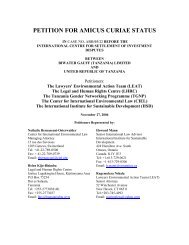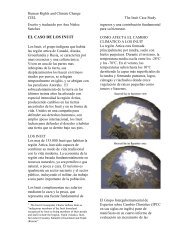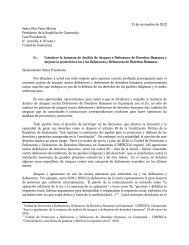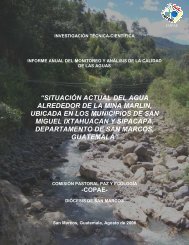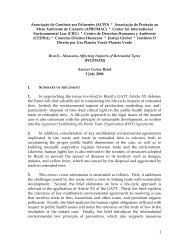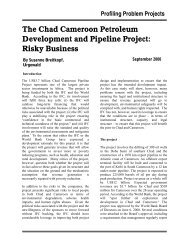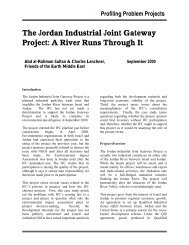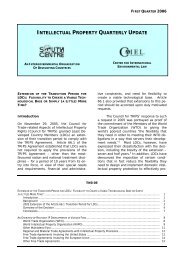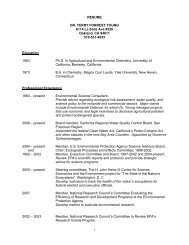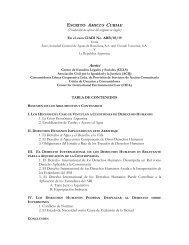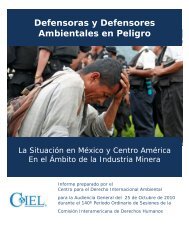International Law on Investment: The Minimum Standard of Treatment
International Law on Investment: The Minimum Standard of Treatment
International Law on Investment: The Minimum Standard of Treatment
You also want an ePaper? Increase the reach of your titles
YUMPU automatically turns print PDFs into web optimized ePapers that Google loves.
In the North American Dredging Company case in 1926,the United States-Mexican Claims Commissi<strong>on</strong> authoritativelyexpounded the nature and scope <strong>of</strong> the Calvo Clause.This case involved two legal instruments: a c<strong>on</strong>tractbetween a U.S. corporati<strong>on</strong> and the Government <strong>of</strong> Mexicoand a Treaty between the United States and Mexico establishinga Claims Commissi<strong>on</strong>. <strong>The</strong> c<strong>on</strong>tract included aclause (18) whereby the c<strong>on</strong>tractor and its employees wouldbe "c<strong>on</strong>sidered as Mexicans in all matters", would not "enjoyany other rights than those established in favor <strong>of</strong>Mexicans", and were "c<strong>on</strong>sequently deprived <strong>of</strong> any rightsas aliens". In c<strong>on</strong>trast, the treaty establishing theCommissi<strong>on</strong> dispensed with the need to exhaust the localremedies rule. After careful analysis <strong>of</strong> the Calvo clauseincluded in the c<strong>on</strong>tract, the Claims Commissi<strong>on</strong> found thatthe investor had waived his right to request diplomatic protecti<strong>on</strong>in any matter arising out <strong>of</strong> the c<strong>on</strong>tract and dismissedthe claim. 10<strong>The</strong> insistence <strong>on</strong> subjecting foreign investment solely tothe domestic law <strong>of</strong> the host State has been adopted andrepeatedly reiterated in the C<strong>on</strong>ferences <strong>of</strong> AmericanStates, e.g., Washingt<strong>on</strong> C<strong>on</strong>ference in 1889. Elements <strong>of</strong>the Calvo doctrine have also been introduced to the lawsand c<strong>on</strong>stituti<strong>on</strong>s <strong>of</strong> several countries in Latin America.<strong>The</strong>se elements <strong>of</strong> State practice, followed by a sense <strong>of</strong>legal obligati<strong>on</strong>, may be evidence <strong>of</strong> regi<strong>on</strong>al customary law<strong>on</strong> the treatment <strong>of</strong> foreign investments in Latin America, aswell as evidence <strong>of</strong> oppositi<strong>on</strong> to the formati<strong>on</strong> <strong>of</strong> internati<strong>on</strong>alcustom regarding State resp<strong>on</strong>sibility for injuries toaliens and <strong>of</strong> persistent objecti<strong>on</strong> to the applicati<strong>on</strong> <strong>of</strong> suchcustom to these States.During the last decades, however, the positi<strong>on</strong>s in thisdebate have changed c<strong>on</strong>siderably. Mexico, a l<strong>on</strong>g-timeprop<strong>on</strong>ent <strong>of</strong> the Calvo doctrine, has accepted Chapter XI <strong>of</strong>the NAFTA. Many other countries in Latin America haveentered into bilateral investment treaties (BITs) c<strong>on</strong>tainingdisciplines and language that also significantly depart fromthe Calvo doctrine. In ir<strong>on</strong>ic c<strong>on</strong>trast, in 2002 the U.S.C<strong>on</strong>gress passed the Trade Promoti<strong>on</strong> Authority Actinstructing its trade negotiators to ensure that foreigninvestors are not accorded greater substantive rights thanU.S. nati<strong>on</strong>als. 11 This language is clearly reminiscent <strong>of</strong>Calvo, and flows from the greater sensitivities in U.S. federal,State, and local governments affected by NAFTA ChapterXI cases. <strong>The</strong> impacts <strong>of</strong> these recent developments, c<strong>on</strong>trastedagainst century-old positi<strong>on</strong>s and c<strong>on</strong>troversy, areyet to be assessed.<strong>on</strong> the basis <strong>of</strong> internati<strong>on</strong>al law, and in exercising thispower, it heard the Neer and the Roberts cases. <strong>The</strong> decisi<strong>on</strong>s<strong>of</strong> the Claims Commissi<strong>on</strong> have been regarded asauthoritative formulati<strong>on</strong>s <strong>of</strong> the minimum internati<strong>on</strong>al lawstandard for treatment <strong>of</strong> aliens.Paul Neer was a U.S. nati<strong>on</strong>al murdered by a group <strong>of</strong> men<strong>on</strong> his way back from a mine, where he served as superintendent.His wife filed a claim arguing that the Mexicanauthorities had shown unwarranted lack <strong>of</strong> diligence ininvestigating the murder. <strong>The</strong> Claims Commissi<strong>on</strong> notedthat while the authorities might have acted in a more vigorousand effective way than they did, it was not for an internati<strong>on</strong>altribunal to decide whether another course <strong>of</strong> proceduretaken by the local authorities might have been moreeffective. <strong>The</strong> Claims Commissi<strong>on</strong> expressed the minimumstandard in the following terms,[T]he propriety <strong>of</strong> governmental acts should be put tothe test <strong>of</strong> internati<strong>on</strong>al standards, and…. <strong>The</strong> treatment<strong>of</strong> an alien, in order to c<strong>on</strong>stitute an internati<strong>on</strong>aldelinquency, should amount to an outrage, to badfaith, to willful neglect <strong>of</strong> duty, or to an insufficiency<strong>of</strong> governmental acti<strong>on</strong> so far short <strong>of</strong> internati<strong>on</strong>alstandards that every reas<strong>on</strong>able and impartial manwould readily recognize its insufficiency. Whetherthis insufficiency proceeds from deficient executi<strong>on</strong><strong>of</strong> an intelligent law or from the fact that the laws <strong>of</strong>the country do not empower the authorities to measureup to internati<strong>on</strong>al standards is immaterial. 12Roberts was a U.S. nati<strong>on</strong>al c<strong>on</strong>fined for nineteen m<strong>on</strong>thsin a small cell al<strong>on</strong>g with thirty or forty other men, with nocleaning or sanitary facilities, no furniture, and no opportunitiesto exercise. <strong>The</strong> Claims Commissi<strong>on</strong> declared thatequality, although relevant in determining the merits <strong>of</strong> acomplaint <strong>of</strong> mistreatment <strong>of</strong> an alien, is not the ultimate test<strong>of</strong> the propriety <strong>of</strong> the acts <strong>of</strong> authorities in the light <strong>of</strong> internati<strong>on</strong>allaw. Rather, the test is whether aliens are treatedin accordance with ordinary standards <strong>of</strong> civilizati<strong>on</strong>. <strong>The</strong>Claims Commissi<strong>on</strong> c<strong>on</strong>cluded that that the treatment <strong>of</strong>Roberts was such as to warrant an indemnity <strong>on</strong> the ground<strong>of</strong> cruel and inhumane impris<strong>on</strong>ment. In the Roberts case,the Claims Commissi<strong>on</strong> applied the Neer standard, wherebyevery reas<strong>on</strong>able and impartial man would readily recognizeoutrage.MST AND TREATIES OF FRIENDSHIP, COMMERCE, ANDNAVIGATIONTHE EARLY CASES IN THE 1920S AS EVIDENCE OF MST INCUSTOMARY LAWDuring the decade <strong>of</strong> revoluti<strong>on</strong>ary activity between 1910and 1920, Mexico experienced great political and social turmoil.After stability returned, Mexico entered into separateclaims agreements with five European States and theUnited States, whose nati<strong>on</strong>als had suffered injuries duringthe previous decade. <strong>The</strong> United States-MexicoCommissi<strong>on</strong> was granted jurisdicti<strong>on</strong> to decide these cases2During the XXth century, the debate whether an internati<strong>on</strong>alcustom providing for a minimum standard <strong>of</strong> treatmentfor investments evolved in parallel with the c<strong>on</strong>clusi<strong>on</strong> <strong>of</strong>treaties establishing distinct legal regimes for the protecti<strong>on</strong><strong>of</strong> foreign investment. This overlap between customary lawand c<strong>on</strong>venti<strong>on</strong>al law introduces a degree <strong>of</strong> complexity tothe debate over MST, which calls for examinati<strong>on</strong> <strong>of</strong> friendship,commerce, and navigati<strong>on</strong> (FCN) treaties, the influentialICJ's decisi<strong>on</strong> in the ELSI case, and the emergence <strong>of</strong>modern-day bilateral investment treaties (BITs).THE CENTER FOR INTERNATIONAL ENVIRONMENTAL LAW AUGUST, 2003



